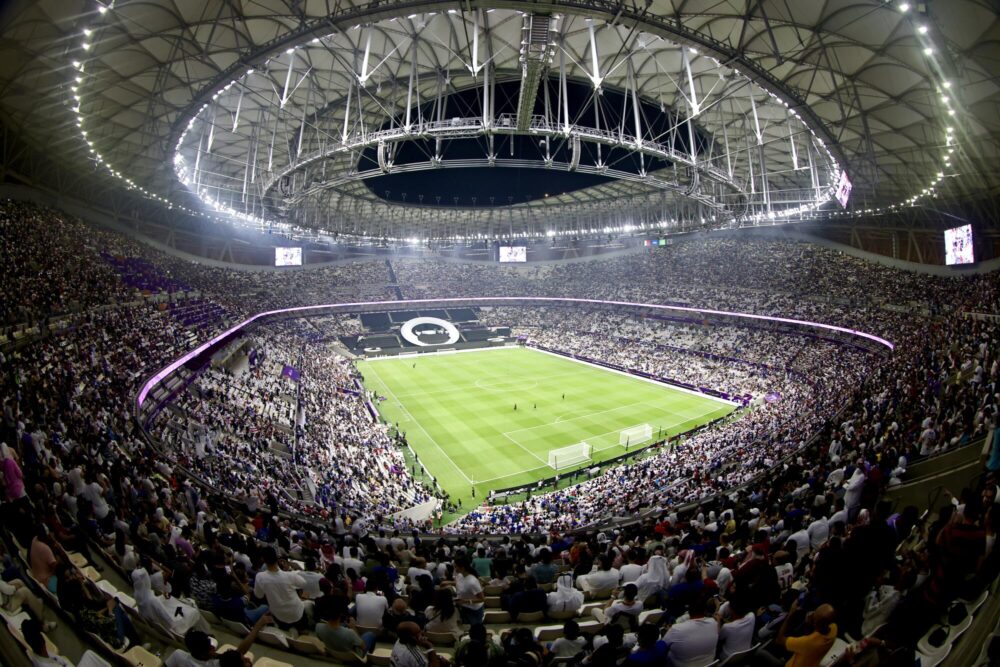Stadiums are more than just venues, they are where passion ignites, history is made, and memories are forged. For soccer fans, these arenas are temples of devotion, where they cheer their team with unmatched fervour.
Over the years, stadiums have evolved from modest grounds into architectural marvels, showing cutting-edge technology, massive capacities, and extravagant designs.
The price tags for some of these stadiums are as jaw-dropping as their sheer size.
Here’s a look into the 10 most expensive soccer stadiums in history.
1. Yankee Stadium (£1.5B)
- Location: New York City, USA
- Capacity: 28,000 (expandable to 45,000)

Yankee Stadium is a marvel of engineering and luxury. Known as the home of the New York Yankees, this stadium also doubles as a football venue for New York City FC.
Opened in 2009, it blends history and modernity, paying homage to its predecessor while incorporating state-of-the-art facilities.
Despite its hefty £1.5B price tag, the stadium has drawn criticism for occupying surrounding community spaces and failing to meet international football match criteria.
Nonetheless, its retractable roof and high-end amenities make it a landmark in sports infrastructure.
2. Mercedes-Benz Stadium (£1B)
- Location: Atlanta, USA
- Capacity: 71,000

The Mercedes-Benz Stadium redefines modern stadium design with its iconic retractable roof that resembles a camera lens.
Built for around £1B, it hosts Atlanta United FC matches alongside American football games. Its eco-friendly features, like a rainwater collection system and solar panels, highlight the future of sustainable stadiums.
This venue is one of the potential stadiums for the 2026 FIFA World Cup, cementing its place in football history. Its futuristic aesthetics and massive capacity make it a favourite among fans and critics.
3. Singapore National Stadium (£1B)
- Location: Kallang, Singapore
- Capacity: 55,000

Opened in 2014, the Singapore National Stadium is an architectural and technological wonder.
Its fully retractable roof and dynamic dome design allow seamless transitions between sports and events. Despite its modest capacity, it stands out as a hub of innovation, forming part of the larger Singapore Sports Hub.
The stadium hosts football matches, concerts, and rugby games, making it a versatile venue that justifies its £1B cost. Its modern features have set a benchmark for stadiums worldwide.
4. Tottenham Hotspur Stadium (£1B)
- Location: London, England
- Capacity: 63,000

The Tottenham Hotspur Stadium, opened in 2019, is a huge proof of ambition. Built as part of Tottenham Hotspur’s vision for long-term growth, this venue is one of the most advanced stadiums in the world.
It features an innovative interchangeable pitch, allowing it to host both football and NFL games.
The design emphasizes a fan experience, with a massive single-tier south stand that amplifies the atmosphere. For £1B, Spurs have created a stadium that doubles as a football fortress and a multi-sport entertainment hub.
5. Wembley Stadium (£1B)
- Location: London, England
- Capacity: 90,000

Popularly within the English football circle, Wembley Stadium is a prominent venue and the largest stadium in the UK. Its striking 133-meter arch, visible from miles away, is more than just an aesthetic marvel—it also supports the roof structure.
Since its reopening in 2007, Wembley has hosted countless historic moments, from FA Cup finals to the Euro 2020 semifinals and final.
Despite its £1B cost, the stadium remains a cherished venue, attracting millions of fans every year.
6. Olympic Stadium (£1B)
- Location: Montreal, Canada
- Capacity: 56,000

Nicknamed the “Big O” due to its circular roof, Montreal’s Olympic Stadium was built for the 1976 Summer Olympics.
While its £1B construction cost and mounting maintenance expenses earned it the nickname “Big Owe,” the stadium remains an architectural marvel.
After the Olympics, it became home to various baseball and football teams, with modifications like artificial turf. The venue symbolizes ambition, though its financial legacy remains controversial.
7. Estadio Nacional (£600M)
Location: Brasília, Brazil
Capacity: 69,000

Brazil’s Estadio Nacional, also known as Mané Garrincha Stadium, is a crown jewel in South American football. Situated in the heart of Brasília, this venue has hosted pivotal matches during the 2013 Confederations Cup and 2014 FIFA World Cup.
The £600M investment included major renovations, enhancing its capacity and acoustics. Fans rave about the electric atmosphere, making it a beloved venue despite its high construction and renovation costs.
8. Santiago Bernabéu (£500M)
- Location: Madrid, Spain
- Capacity: 81,000

As the home of Real Madrid, the Santiago Bernabéu is a stadium steeped in footballing legend. Initially built in 1947, it has undergone multiple renovations, the most recent of which elevated its cost to £500M.
The addition of a retractable roof and modernized interiors have made it one of the most intimidating arenas in world football.
On European nights, the atmosphere inside the Bernabéu is electrifying, with fans and opponents alike acknowledging its legendary status.
9. Krestovsky Stadium (£500M)
- Location: Saint Petersburg, Russia
- Capacity: 65,000

Also known as the Saint Petersburg Stadium, the Krestovsky Stadium is one of Russia’s most expensive sporting projects. Completed in 2017, it features a unique spaceship-like design, capturing the imagination of fans worldwide.
Built for the 2018 FIFA World Cup, this £500M stadium has hosted key matches in tournaments like the 2017 FIFA Confederations Cup and Euro 2020.
Its futuristic design and vibrant atmosphere make it a standout venue.
10. London Stadium (£486M)
- Location: London, England
- Capacity: 66,000

Originally built for the 2012 London Olympics, the London Stadium is now home to West Ham United. Despite its transition to a football venue, the stadium retains its multi-purpose nature, hosting athletics events, concerts, and other sports.
The £486M cost reflects its Olympic legacy and the extensive modifications needed for football.
While West Ham fans initially struggled to adapt to their new home, the venue has gradually become a defining feature of the club’s modern era.



